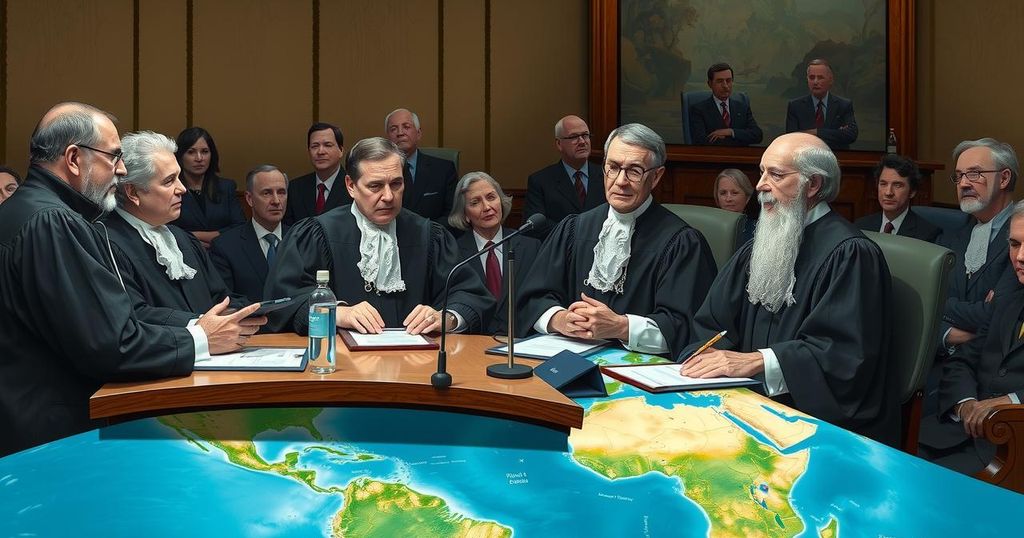World Court Judges Raise Key Questions in Climate Change Advisory Opinion

The International Court of Justice held hearings in December for an Advisory Opinion on state obligations in climate change, requested by the UNGA. The discussions included questions from judges regarding international law, fossil fuel production, and the rights to a clean environment. Responses are due by December 20, with the opinion expected by mid to late 2025, influencing future climate litigation and policies.
In early December, the International Court of Justice (ICJ) conducted oral hearings for its Advisory Opinion pertaining to the obligations of states regarding climate change, at the behest of the United Nations General Assembly (UNGA). The Court is tasked with determining the financial liabilities of nations for their contributions to climate change, as well as the necessary actions to mitigate its effects. At the conclusion of the hearings, four judges posed additional inquiries to participants, with responses due by December 20, 2023.
The ICJ, established in 1945 via the UN Charter, serves as a neutral legal forum for the peaceful resolution of disputes between nations. Located in The Hague, Netherlands, the Court operates independently from the International Criminal Court (ICC), focusing exclusively on civil disputes. The ICJ is composed of 15 judges elected for nine-year terms, with current representation from various countries including the United States, Brazil, and China, among others. Judge Nawaf Salam from Lebanon serves as the Court’s President.
In March 2023, Vanuatu called for the UNGA to request the ICJ’s advisory opinion on states’ legal obligations regarding climate change prevention and mitigation. Although the Court’s opinions are non-binding, they establish precedents that could influence future climate-related litigation and policy development. The UNGA’s specific queries included the responsibilities of states under international law to protect the climate system for current and future generations and the legal ramifications for states whose actions contribute to climate harm.
During the hearings held from December 2 to December 13, over 100 countries provided 30-minute oral statements, laying out their legal arguments. A significant point of contention arose as large industrial nations argued that existing climate treaties, such as the United Nations Framework Convention on Climate Change (UNFCCC) and the Paris Agreement, supersede other potential legal obligations related to climate action. Conversely, developing countries contended that these treaties were merely foundational documents and that violations of human rights due to climate change justify reparations from major polluters to those most adversely affected.
Notably, unlike many appellate courts, the ICJ traditionally refrains from immediate questioning during presentations, reserving inquiries for later submission. Following the hearings, the judges posed specific questions for further clarification, focusing on aspects such as the obligations under international law concerning fossil fuel production, interpretations of treaty obligations, and the recognition of a right to a clean environment. The judges included Judge Sarah Cleveland from the USA, Judge Dire Tladi from South Africa, Judge Bogdan-Lucian Auresco from Romania, and Judge Hilary Charlesworth from Australia.
This article addresses the significant oral hearings conducted by the International Court of Justice, which are pivotal in understanding the legal obligations of states regarding climate change. It highlights the ICJ’s historical role and functionality as the principal judicial organ of the United Nations, emphasizing its capacity to interpret international law in matters of global concern such as climate change. The hearings symbolize a crucial step toward establishing legal frameworks that may guide state responsibilities in mitigating climate-related harms, particularly for vulnerable nations.
The oral hearings at the International Court of Justice mark an important phase in establishing legal precedents concerning the obligations of states in addressing climate change. Through the posed questions and the arguments from various nations, the outcome could significantly shape future climate litigation and international law. The anticipated advisory opinion will not only reflect the current legal landscape but also serve as a guiding framework for legislative action regarding climate responsibilities.
Original Source: www.forbes.com








